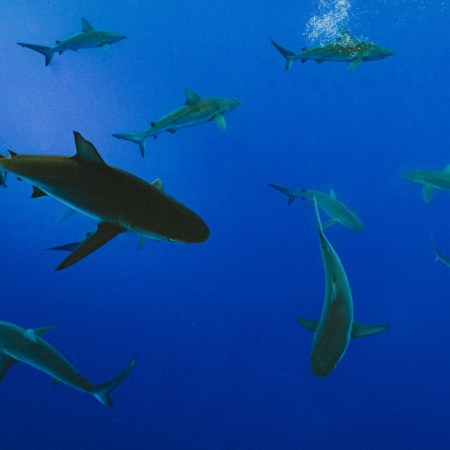Sharks! Those mysterious denizens of the deep that arouse every emotion under the sun: wonder, fascination, fear, confusion, elation, peeing in your wetsuit … you name it. I have seen divers get out of the water and cry with joy at the experience of seeing a shark. Yes, it’s that powerful.
But outside of the conservation industry, sharks have a very misunderstood reputation. From law firms to movie theaters to billiards halls, a shark is something that is essentially predatory, dangerous and not to be trusted (When’s the last time you saw a movie in which the shark played the good guy?). And due in large part to that reputation, sharks are being hunted — prolifically.
Here are some startling numbers that are largely unknown outside of shark-advocacy circles:
- 100 million sharks are killed each year, with fins from up to 73 million sharks ending up in the shark fin trade … that’s all for an Asian delicacy called shark fin soup
- 70 percent of the 14 most common shark species involved in the trade are considered at high or very high risk of extinction
- Some shark populations have declined by more than 90 percent in recent decades due to overfishing
- Endangered species trafficking is the fourth largest illegal business in the world, close behind narcotics, weapons and human trafficking.
So what can we do? Glad you asked.
A bipartisan bill has been introduced in Florida to stop the sale and trade of shark fins throughout the state (12 U.S. States have already decided to move ahead with fin trade prohibitions). Shark Allies is a nonprofit organization dedicated to the conservation of oceans and the protection of sharks. I happen to be an eight-year Shark Allies board member, and this is one of the most important measures for shark conservation I’ve seen. Our founder Stefanie Brendl — who was instrumental in the 2010 fin ban in Hawaii that set the groundwork for every other sale, trade and possession bill in the US and beyond — is currently in Florida supporting the legislation. One of the greatest assets to the success of the bill is the voice of the community: support letters from as many people as possible will be an invaluable tool, as it is the most likely material the staffers and committee members will actually read when they meet next week.
So here is how YOU can help save sharks right now:
If you just want to sign on in support of the bills, do so on our Shark Allies page.
And if you want to be a shark superstar, you can join the activists, celebrities, business owners and individuals by writing a letter on behalf of sharks and in support of the bills (please send yours to stefanie@sharkallies.com).
Need an example? Here’s mine:
My name is Kinga Philipps. I am a journalist, TV host, producer and author. I am expressing my support of the proposed Florida fin bill. I strongly believe that our country should be setting an example for ocean conservation and protection of vulnerable wildlife that are vital to healthy ocean ecosystems. Stopping the fin trade in a state like Florida is incredibly important. In my 20 years of travel and hosting various television programs for National Geographic, Travel Channel, documentaries and more — several of them in Florida — I have been privy to the value sharks add to the economy and health of our oceans. I would be proud to call the state where I spent my favorite childhood vacations an ally in the ongoing fight to protect vulnerable ecosystems.
Thank you for your support,
Kinga Philipps
Still need convincing? Here’s what The Miami Herald had to say about the severity of the situation:
“Florida now ranks as the largest importer of shark fins in the country, according to Oceana. And shark fins from Central America often pass through Miami International Airport on their way to Hong Kong, according to data supplied by the private trade data aggregate ImportGenius. It wasn’t always that way. For years, Los Angeles and then Houston were the transit hubs for Central American fins. But as Texas and California tightened restrictions, the exports moved to Florida. Between 2015 and the middle of 2017, Costa Rican companies alone moved 180,000 pounds of dried shark fins through MIA on their way to Asia using two small logistics companies. Those fins were valued at almost $2.5 million dollars. It’s nearly impossible to know if any of the shark fins flown through MIA were from endangered species. But a 2017 independent analysis of shark fin clippings imported to Hong Kong suggests that a third of the fins may come from internationally protected species.”
Consider also that sharks are worth far more, in an economic sense, when they’re alive. Income from dive tourism is far greater than that of shark fishing, and it is a renewable resource that can continue for many years to come, as long as you have abundant reef and marine life. Internationally, shark watchers spend an estimated $314 million on shark ecotourism every year, and researchers expect that to double to $780 million in 20 years.
If you’re a details person and/or need five minutes of reading material, here’s a more detailed breakdown of the exact stipulations of the bill, care of Shark Allies.
Now get out there and do your part — this is our chance to make a real difference for sharks!
Main image via Kinga Phillips
The Charge will help you move better, think clearer and stay in the game longer. Subscribe to our wellness newsletter today.
























